Businesses rely heavily on internal metrics to drive decisions. However, external data that provides competitive intelligence is becoming an equally critical input for delivering better-positioned products and services. Especially in the technology sales and marketing environment, where competition is tight.
Competitive intelligence tools allow you to peer into your competitors’ products, sales, marketing, and overall strategies—offering valuable insights to decision-makers who want to stay ahead of the curve.
What are Competitive Intelligence Tools?
Competitive intelligence tools, or competitor intelligence tools, are a broad collection of tools that enable businesses to gather information on their competitors. Competitor intelligence tools span marketing intelligence, sales intelligence, business intelligence, buyer intent data tools, and tools that can see into competitors’ tech stack.
Competitive intelligence tools offer insights into the current and potential future strategies of their business peers. Leaders can make intelligent decisions based on data to drive their company’s vision forward.
Why Are Competitive Intelligence Tools Important?
Competitive intelligence tools allow companies to understand their opportunities and challenges within their competitive environment. By accessing outside data, companies can have a more realistic picture of their positioning in a market and where they need to invest resources to gain an advantage.
Competitive intelligence tools help:
- Product teams develop better applications
- Executives keep up with the news and developments of top competitors
- Marketing teams understand their best opportunities for product positioning
- Digital marketing teams understand what content, social, and advertising strategies to pursue
- Executives see the digital footprint of competitors in order to compare investments
By having critical information located in a single platform, team members can easily access data before analyzing and collaborating on future projects.
12 Competitive Intelligence Tools to Use in 2024
Competitive intelligence varies a great deal by industry and the scope of activities a team wants to track. So we’ve divided these intelligence tools into three subcategories: overall business intelligence, marketing, and sales.
Business Intelligence Tools
1. Gartner
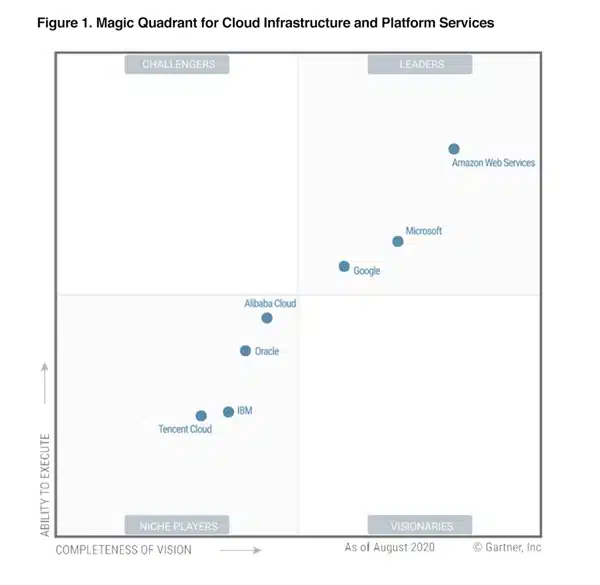
(source)
Main Perk: High-quality, in-depth insights and advisory
Best For: Enterprises
Gartner is one of the world’s leading business intelligence companies, providing key tools sales leaders can use to increase their growth. The breadth and depth of their information are vast, but are offered in a consultative manner rather than via a software solution.
Executives can use their insights and tools to fortify their strategies and grow with consumer insights based on research. However, these types of competitive intelligence tools shouldn’t be leaned on exclusively as they often rely on self-reported data.
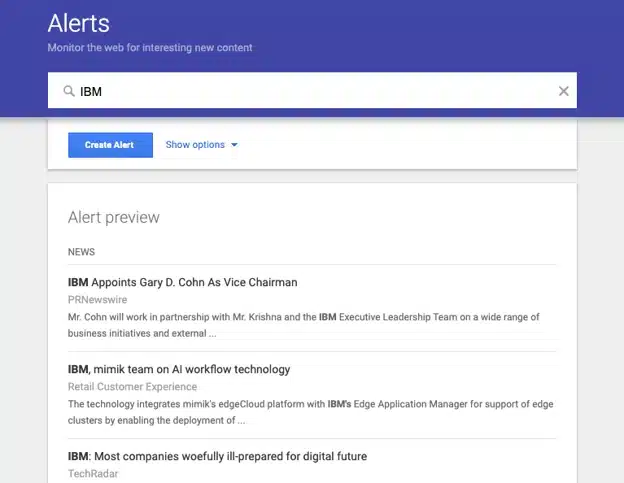
Main Perk: Performing more efficient research
Best For: Everyone
Google Alerts allows you to set up notifications when certain topics, keywords, names, or websites start buzzing around the web.
Google Alerts helps you research competitors and their strategies more efficiently. You can track your company’s brand, important names and influencers, and competitors. Google Alerts also helps you build links by finding opportunities for backlinks more efficiently.
3. Crunchbase
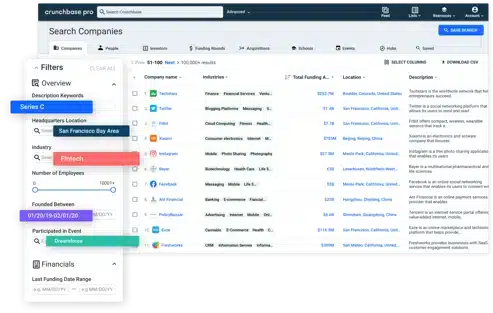
(source)
Main Perk: Find emerging trends and conduct market research with live data
Best For: Mid-size and Enterprise
Crunchbase is an online database that offers information on public and private companies of all sizes. At the most basic level, companies can research other companies for free. Paid subscriptions give users advanced search and monitoring features and data enrichment capabilities.
Users can import lists of companies they’re researching and Crunchbase will find information on those companies. Data is presented in a flexible format and users can set up personalized alerts for companies they monitor.
![]()
(source)
Main Perk: AI-enabled platform to track information on competitors, customers, and industry segments in one platform. Global companies benefit from its ability to track non-English sources.
Best For: Enterprises
Contify uses machine learning to drive its market and competitive intelligence platform. The solution collects and curates actionable information for users. Their data comes from over 200,000 sources, including news websites, job boards, company websites, press release agencies, social media, regulatory portals, subscription databases, and review websites. Users can also add custom sources, like discussion forums and specific trade publications.
While machine learning mines the data, this solution makes their data more precise with a layer of human curation.
Marketing Intelligence Tools
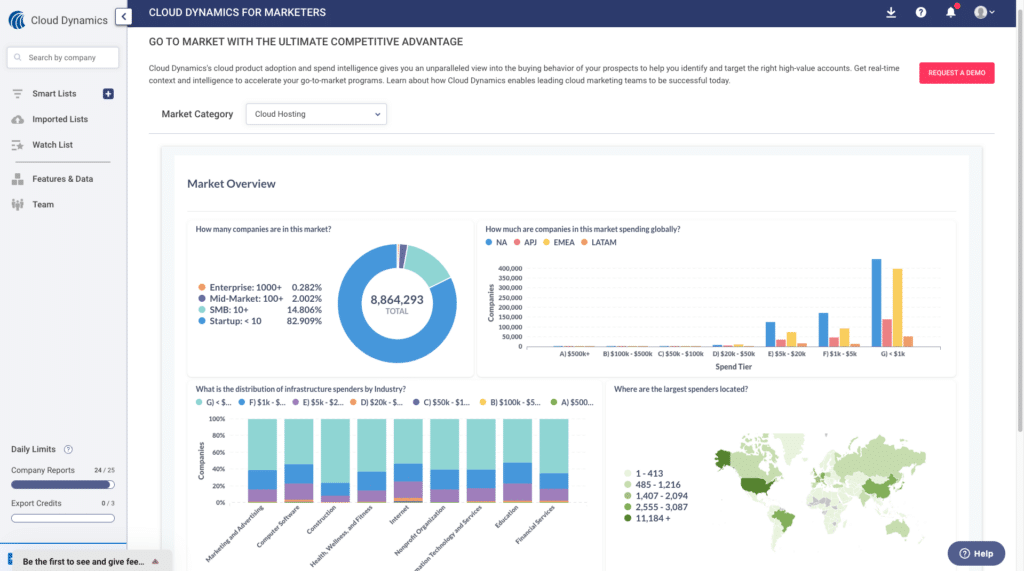
Main Perk: Visibility into the spend and usage data of cloud product adoption and spend intelligence
Best For: Cloud marketing leaders, sales, marketing, and revenue operations teams
Cloud Dynamics delivers cloud product adoption and spend intelligence to help cloud revenue teams focus their go-to-market strategy on the prospects with the highest revenue potential. By providing marketing and sales teams with detailed cloud product adoption, usage, and spend data for millions of businesses around the world and 21,000+ cloud products, you can turn your prospect’s cloud spend and usage data into revenue opportunities.
6. Moat (By Oracle Data Cloud)
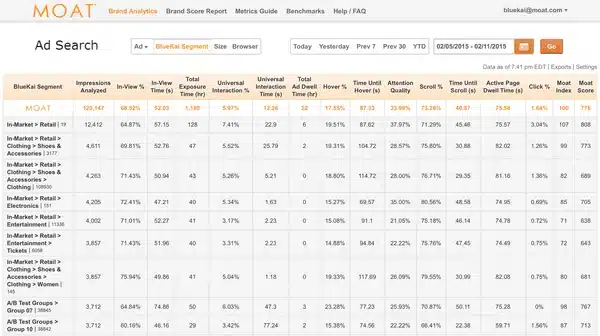
(source)
Main Perk: Viewing competitors’ digital creative history
Best For: Mid-size businesses to enterprises
Data intelligence isn’t the only thing that will help you beat out your competition. Digital creative, including advertisements and your competitor’s creative history, can be a huge asset as you work with your creative teams on advertising campaigns. Moat allows you to review competitors’ ad campaigns up to three years in the past.
Moat also has some cool automated monitoring features that you can set to alert you when competitors post a new ad. This feature will also allow you to experience your competitor’s strategic roll-out for the ads in a campaign.
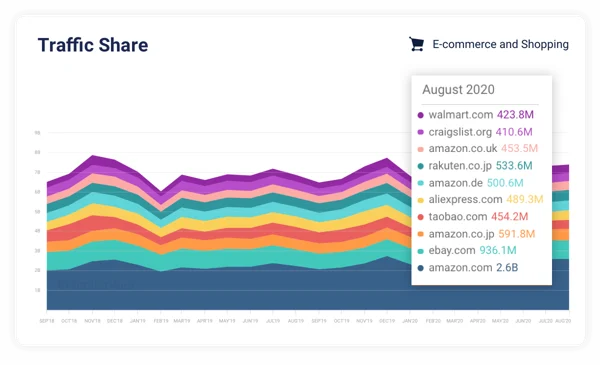
(source)
Main Perk: Deep insights
Best For: Sales and marketing teams
With SimilarWeb, you’ll have an easier time researching your competition’s referrals and other sources of traffic. SimilarWeb does a good job of letting you really see how you stack up against your competitors in terms of bounce rate, page visits, page views, and time on site. SimilarWeb’s dashboard is most commonly compared to Google Analytics but for your competitor’s domains.
SimilarWeb also provides competitor mobile app data, where you can view one month of mobile data and three months of web traffic data for free. SimilarWeb also offers SEO and PPC research, including keywords, traffic sources, and visitor engagement.
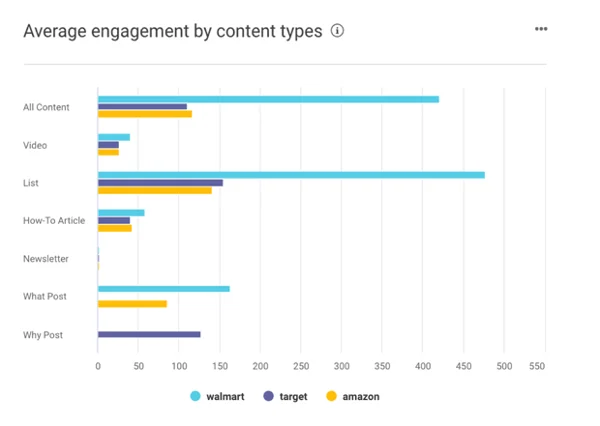
(source)
Main Perk: Understanding competitors’ content strategies
Best For: Midsize businesses
Before you jump into a content strategy session, you want to be armed with knowledge of trending topics and what your competitors are focusing on. BuzzSumo helps you better understand your competitors’ content strategies and how they’re planning to reach their audience.
The platform supplies intelligence pertaining to competitor content that is receiving traction, how your content compares to competitors, and content curation and planning. BuzzSumo allows you to conduct in-depth analysis and filter your research by topic and timeliness.
BuzzSumo also features social media monitoring and even influencer outreach. It enables you to create alerts so you know when competitors have published new content.
![]()
(source)
Main Perk: Analyzes millions of text-based documents and organizes that content visually
Best for: Midsize to enterprise level
With Nebase Quid, businesses can uncover insights and social sentiment across industries. This social analytics platform uses historical and real-time data to offer market and branding research, competitive intelligence, trend analysis, voice of consumers, and more. This tool helps teams identify risks and new opportunities to drive new strategies.
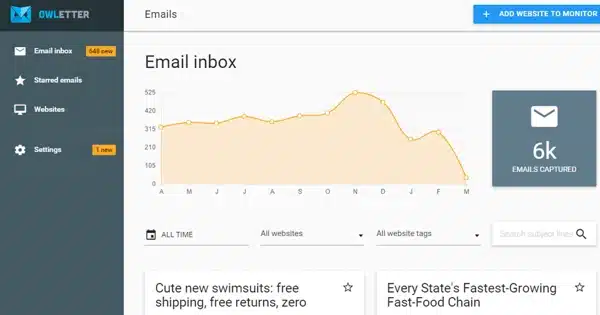
(source)
Main Perk: Monitoring competitors’ email marketing
Best For: Agencies and retailers
Owletter is an email analytics intelligence tool that’s great for studying how your competitors are using their email marketing. Learn how often they send out emails, on what days, and whether their email schedule changes seasonally.
Owletter also keeps marketers in mind with their tagging and alerting features. As a marketer, you can save tags based on trends you want to follow and receive notifications when those tags pop up.
For creative agencies, Owletter takes it a step further and allows you to use tags to track prospective clients or current clients’ competitors.
Sales Intelligence Tools
11. Klue
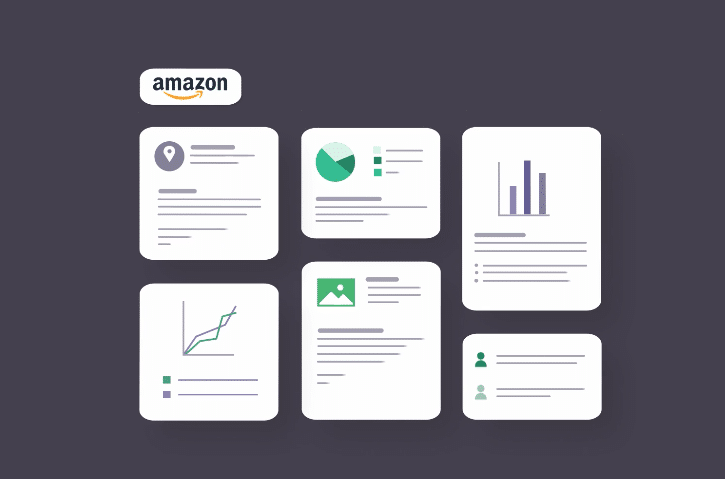
(source)
Main Perk: Tracks competitors and compares data to internal sources
Best For: Enterprise sales
Klue is an AI-powered platform for product marketers and sales teams to gain quick insights into competitors. The platform organizes data into visual battle cards, making it simple for sales teams to view the data they need.
Data is mined from publicly available information. Teams can catalog information and easily share it with colleagues.
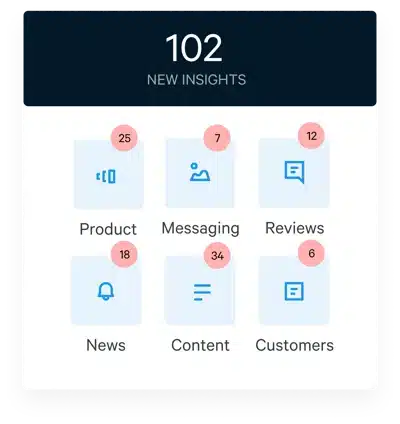
(source)
Main Perk: See competitor products, messaging, reviews, news, content, and customers in one platform
Best For: Enterprises
Crayon’s software platform enables businesses to track competitor pricing changes, marketing campaigns, and more. Companies can see potential hiring plans, go-to-market strategies, and more. This solution also offers battle cards to inform sales pitches.
Crayon helps analysts monitor market trends, using both artificial and human intelligence. Customers receive a weekly curated email digest of notable market trends.
Find The Best Data For Your Competitive Intelligence Program
Every company and its competitors are different. It takes time to explore the best competitive intelligence tools to gain the insights you need to make bold moves with confidence.
Modern competitive intelligence for digital product vendors is evolving. Contextual data offers visibility into a company’s tech stack, how companies use solutions, and more importantly, how much they’re currently spending on their tech stack.